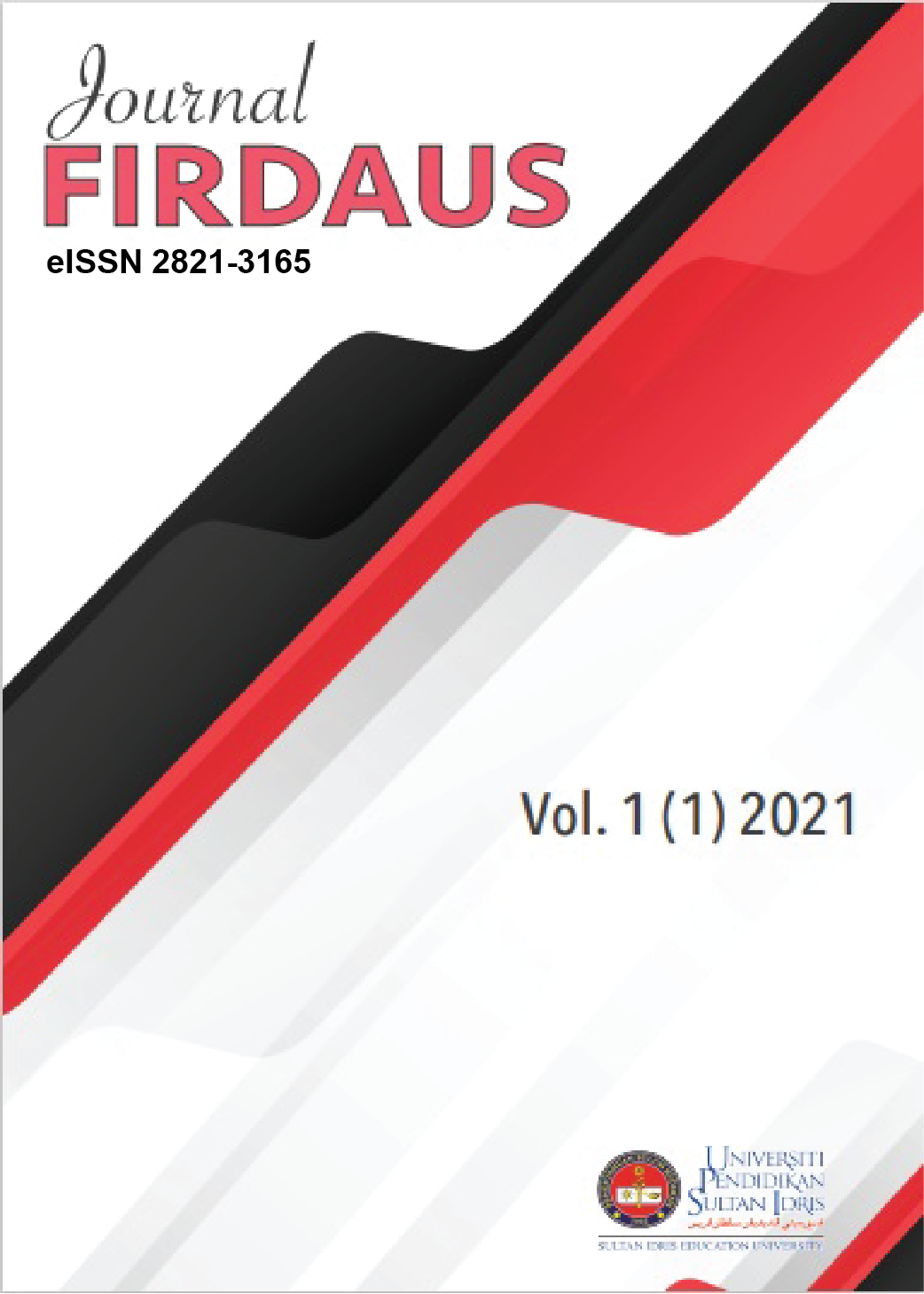Distance Learning Model for Islamic Religious Education Subjects in Non Internet Server Provider (ISP) Areas
DOI:
https://doi.org/10.37134/firdaus.vol1.1.5.2021Keywords:
PAI learning, covid-19, ISPAbstract
Distance learning is the final alternative in realizing sustainable education during the Covid-19 period. The distance learning model will not face serious problems for areas that have a strong internet network, but distance learning will face various problems for areas that do not yet have an Internet Server Provider (ISP). Therefore, this study aims to reveal how the learning model was carried out during covid-19 in non-ISP areas, especially for Islamic religious education subjects. The research was conducted with a qualitative approach, data collection techniques were observation, interviews, and documentation studies. The results of the study are that Islamic religious education teachers in areas where there is no internet carry out distance learning through: first, learning plans are made according to the conditions when learning takes place remotely. Second, the implementation of distance learning in non-ISP areas is that teachers provide information on information boards in schools related to tasks that must be carried out by students, students carry out tasks according to information available at school and take them to school, and for students who the location where he lives close to the teacher's house can take him directly to the teacher's house. Third, the methods, media, and learning resources used are that the method does not use standard learning methods, learning media are also not used, while the learning resources used are Islamic Religious Education books which are commonly used in SD Negeri 10 Lubuk Layang.
Downloads
References
Akmal, R., & Ritonga, M. (2020). Learning of Islamic Religious Education in Covid-19 Period: Analysis of Problems and Solutions for Parents. Jurnal Tarbawi, 05(02), 177–188.
Alam, L. (2020). Kontestasi Kebijakan Pendidikan Islam di Era Orde Baru dan Reformasi. Ruhana: Islamic Education Journal, 3(2), 59–79. https://doi.org/https://doi.org/10.31869/ruhama.v3i2.2223
Allen, A. (2015). Effective School Management and Supervision : Imperative for Quality Education Service Delivery. AFRREV, 9(38), 62–74. https://doi.org/http://dx.doi.org/10.4314/afrrev.v9i3.6
Arifin, S. (2016). Islamic religious education and radicalism in Indonesia: Strategy of de-radicalization through strengthening the living values education. Indonesian Journal of Islam and Muslim Societies, 6(1), 93–126. https://doi.org/10.18326/ijims.v6i1.93-126
Arlinghaus, K. R., & Johnston, C. A. (2018). Advocating for Behavior Change With Education. American Journal of Lifestyle Medicine, 12(2), 113–116. https://doi.org/10.1177/1559827617745479
Harianto, Ritonga, M., & Saputra, R. (2021). How is the Ability of Islamic Religious Education Teachers in Designing and Using ICT Media ? Proceedings of the 1st International Conference on Education, Humanities, Health and Agriculture, ICEHHA 2021. https://doi.org/10.4108/eai.3-6-2021.2310749
Hoque, K. E., Banu, H., Kenayathulla, B., Subramaniam, M. V. D. O., & Islam, R. (2020). Relationships Between Supervision and Teachers ’ Performance and Attitude in Secondary Schools in Malaysia. SAGE Open, 1–11. https://doi.org/10.1177/2158244020925501
Indonesia, K. P. R. (2003). Undang-Undang Republik Indonesia Nomor 20 Tahun 2003 tentang Sistem Pendidikan Nasional (pp. 1–33). Sekretaris Negara republik Indonesia.
Khairunnas, Ritonga, M., & Lahmi, A. (2021). Pendididkan Agama Islam sebagai Basic Kedisiplinan: Studi Fenomenologi di SMP Negeri 3 Lembah Melintang Pasaman Barat. Al-Muaddib :Jurnal Ilmu-Ilmu Sosial Dan Keislaman, 6(1), 55–65. https://doi.org/10.31604/muaddib.v5i1.55-65
Khalili, Huda M., Rosman A.S., Mohamed A.K., Marni N. (2021) Digital Learning Enhancement Through Social Network Site (SNS). In: Silhavy R., Silhavy P., Prokopova Z. (eds) Software Engineering Application in Informatics. CoMeSySo 2021. Lecture Notes in Networks and Systems, vol 232. Springer, Cham. https://doi.org/10.1007/978-3-030-90318-3_35
Lubis, S. H. (2018). Islamic Religious Education (Pai) Learning Management in the Formation of Student Characters At State Senior High School I of Panyabungan. International Journal on Language, Research and Education Studies, 2(3), 369–380. https://doi.org/10.30575/2017/ijlres-2018091206
Moran, S. (2018). Purpose-in-action education: Introduction and implications. Journal of Moral Education, 47(2), 145–158. https://doi.org/10.1080/03057240.2018.1444001
Mulyadi, D., Huda, M., & Gusmian, I. (2022). Smart Learning Environment (SLE) in the Fourth Industrial Revolution (IR 4.0): Practical Insights Into Online Learning Resources. International Journal of Asian Business and Information Management (IJABIM), 13(2), 1-23.
Putri, A. H., Permatasari, F. E., Hijriyah, A. L., & Mauludiyah, L. (2021). Arabic Quizzes Game to Improve Arabic Vocabulary. Tanwir Arabiyyah: Arabic as Foreign Language Journal, 1(1), 45–54. https://doi.org/https://doi.org/10.31869/aflj.v1i1.2484
Ritonga, M., Kustati, M., Budiarti, M., Lahmi, A., Asmara, M., Kurniawan, R., Putri, N., & Yenti, E. (2021). Arabic as foreign language learning in pandemic COVID-19 as perceived by students and teachers. Linguistics and Culture Review, 5(1), 75–92. https://doi.org/10.37028/lingcure.v5n1.726
Ritonga, M., Lahmi, A., Ishaq, Septiana, V. W., & Mahmud. (2021). Religious Extracurricular as a Capital for Character Development of Students in Junior High School. Psychology and Education Journal, 58(1), 682–689. https://doi.org/10.17762/pae.v58i1.817
Ritonga, M., Nazir, A., & Wahyuni, S. (2016). Pembelajaran Bahasa Arab Berbasis Teknologi Informasi dan Komunikasi. Arabiyat: Jurnal Pendidikan Bahasa Arab Dan Kebahasaaraban, 3(1), 1–12. https://doi.org/http://dx.doi.org/10.15408/a.v3i1.2879
Sajida, S., & Ranjani, R. (2020). Examining the Internet Quota Subsidy Policy in Indonesia. Iapa Proceedings Conference, 19, 298–319. https://doi.org/10.30589/proceedings.2020.411
Salehudin, M., Zulherman, Z., Arifin, A., & Napitupulu, D. (2021). Extending Indonesia Government Policy for E-Learning and Social Media Usage. Pegem Egitim ve Ogretim Dergisi, 11(2), 14–26. https://doi.org/10.14527/pegegog.2021.00
Sartika, F., Ritonga, M., & Rasyid, A. (2020). Implementation of Islamic Religious Education in Madrasah Ibtidaiyah During Covid-19 Pandemic. Khalifa: Journal of Islamic Education, 4(2), 97–117.
Sartika, F., Ritonga, M., Lahmi, A., Rasyid, A., & Febriani, S. R. (2021). Online Learning in the Low Internet Area, Planning, Strategies and Problems Faced by Students During the Covid-19 Period (D. Oliva, S. A. Hassan, & A. Mohamed (eds.); Artificial). Springer. https://doi.org/https://doi.org/10.1007/978-3-030-69744-0
Sukadari, Huda, M., Perianto, E., Haryanto, Subarkah, E. (2021). Improving Education Quality of Elementary School in Indonesia: An Empirical Research. Journal of Southwest Jiaotong University. 56(4), 330-337.
Tisnelly, Ritonga, M., & Rasyid, A. (2020). The Competency of Islamic Education Teachers in Madrasah Ibtidaiyah 1 West Pasaman After Certification. Ruhama : Islamic Education Journal, 3(1), 45–56.





